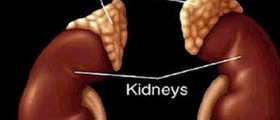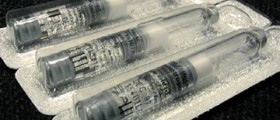
Cushing’s syndrome (CS) is medical condition caused by exposure to increased levels of cortisol (hormone) for a long period of time. Common causes of this syndrome include the use of too much cortisol or some other steroid hormone, such as prednisolone or Prednisone (use for treatment of asthma or rheumatoid arthritis).
Patients suffering from this syndrome usually have fatty hump, rounded (half-moon) face and purplish or red stretch marks on the skin. Hypertension, bone loss and diabetes may also be associated with Cushing’s syndrome.
Causes of Cushing’s Syndrome
Adrenal gland is responsible for production of cortisol. Too much of ACTH (adenocorticotropic hormone) due to tumor of pituitary or adrenal gland, or some other tumor in the pancreas, thyroid or the lungs affect the adrenal gland and stimulates production of cortisone/cortisol, leading to Cushing’s syndrome. Additionally, some tumors in the human body may also produce cortisol on their own, leading to this condition.Treatment Options for Cushing’s Syndrome
Patients suffering from CS are found out to respond well to early treatment of this problem. This way, therapy can return cortisol production to the normal level and improve all symptoms the patient might have. Possible treatment measures include reduction of corticosteroid medications, surgery, radiation therapy or the use of certain drugs.
If the cause of CS is long term use of corticosteroids, your doctor will usually recommend reducing the dose of the drugs. Lower dose will still be adequate to control the problem corticosteroid drugs were prescribed for (such as asthma or arthritis) but they won’t cause Cushing’s syndrome any more. The doctor may also prescribe non-steroid medications doe your medical problems, which won’t provoke CS.
Surgery is recommended for patients whose CS is caused by some tumor. Complete surgical removal of pituitary tumor is commonly done by a neurosurgeon, while other surgeons can perform removal of tumors of the adrenal glands, pancreas or the lungs. Most patients need to take cortisol replacement therapy, for some time after the surgical procedure. Certain patients may need this treatment for good.
Bilateral adrenalectomy (removal of adrenal glands) is reserved for patients who don’t respond to any other treatment option.
Radiation therapy, especially stereotactic radiosurgery or gamma-knife radiation, is advisable for tumors which can be resected completely, as the addition to surgery or for someone who can’t be operated for some reason.
Some medications can also control the amount of cortisol in the body and these can be used before the surgery or if the surgery and radiation therapy won’t give expected results. Ketoconazole (Nizoral), mitotane (Lysodren) and metyrapone (Metopirone) are the most commonly used drugs for this purpose.

















Your thoughts on this
Loading...